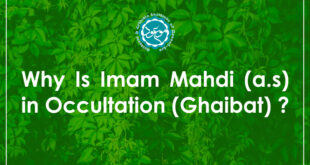Recognition of Imam Mahdi (a.t.f.s.) cannot be acquired except with submission
One of the necessary conditions for acquisition of recognition is total submission to the desires of the Ahlul Bayt (a.s.). In fact it would be not be an exaggeration to state that acquiring recognition is possible only and only through complete submission to the Ahlul Bayt (a.s.). Imam Sadiq (a.s.) declares:
‘You cannot become from the virtuous ones until you have recognition. You will not have recognition until you have believed and confessed. You have not believed and confessed until you submit.’1
Thus affirmation leads towards recognition (of Imam) and submission leads towards affirmation. When a man has all these traits (of submission and affirmation) he will be included among the virtuous ones. This is because virtuous actions spring from pure hearts and recognition and this is attained only through submission. Then the one who does not possess these traits will find himself deprived of recognition and mastership and will be most distant from any virtue. For, testimony is equal to belief and confession by heart. And till such a time that the person inculcates this in himself, he will never taste certainty in recognition.
Thus these four criteria – submission, testimony, recognition and good deeds are critical for every believer, and unless these criteria converge in a person, he will never know the reality of faith. The lowest level of recognition of Imam (a.t.f.s) is in submission to his exhortations and prohibitions. As traditions declare:
‘A worshipper cannot become a believer unless he recognizes Allah and His Prophet (s.a.w.s.) and all the Imams (a.s.) and the Imam of his age and turn to him and submit to him.’2
While unconditional submission was always crucial in the acquisition of recognition, it assumes even more significance in this era of occultation. That is why traditions reiterate the concept of submission thus:
And he does not find any straitness in his heart as to what we have decided and submit to us – the Ahlul Bayt.3
Submission over here implies heartily submission and not superfluous obedience. This means that the believer should submit to the Ahlul Bayt (a.s.) cheerfully and willingly and not grudgingly and reluctantly. Satisfaction and contentment in submission are vital. This is because even if a man believes in the apparent of religion but does not find submission in himself, he will be far from faith, and can possibly venture into polytheism (shirk). The degree of one’s faith is directly related to the degree of one’s submission to the Ahlul Bayt (a.s.). To the extent this submission is weak, faith will be weak, dragging man towards idolatry. This is exactly what Imam Sadiq (a.s.) explains in this tradition:
‘Surely if a nation worships Allah associating naught with Him, and establishes prayers, pays zakaat, performs Hajj, fasts in the month of Ramazan, (then in spite of all this) say why did Allah not do this or why did the Prophet (s.a.w.s.) not do this, instead of doing that, or they have some doubt (although they do not voice these doubts) then due to this they turn polytheists.’
Then Imam (a.s.) related the following verse,
‘But no! by your Lord! They do not believe (in reality) until they make you a judge of that which has become a matter of disagreement among them, and then do not find any straightness in their hearts as to what you have decided and submit with entire submission.’
Then Abu Abdillah (Imam Sadiq) (a.s.) said,
‘Submission is obligatory upon you.’4
The above tradition reveals that the condition of submission is attained when the heart is completely satisfied with everything that the Ahlul Bayt (a.s.) has done or commanded us to do, and has no reservations in accepting it. Indeed this is the reality of faith and the soul of religion. Imam Sajjad (a.s.) declares,
‘Certainly the religion of Allah, the Almighty, cannot be acquired by deficient intellects and false opinions and erroneous conjecture, it is achieved only through submission. Then one who submits to us is safe and one who follows us is guided. One who acts based on their own opinion and conjecture is destroyed. One who objects to a thing that we have said or decreed has disbelieved in the One who has revealed the Seven Verses (Sura al-Hamd) and the Holy Quran, while he is unaware (of his disbelief).’5
The great danger to one’s faith is when one commits a mistake without being aware of its consequences, which are so dangerous that he turns into an apostate, while he considers himself to be a believer. Then safety for man’s faith lies in his submission to the Ahlul Bayt (a.s.) without corrupting it with his own opinion and conjecture.
This, by no means is an easy task, more so in the period of occultation, when there is no direct contact with Imam (a.t.f.s.). The only possible way to reach Imam (a.t.f.s.) in this era is through the traditions of the Imams (a.s.). We must refer to the Imams (a.s.) in all our problems, religious as well as worldly.
Submission to Imamite traditions in occultation
One of the signs of submission to Imam (a.t.f.s.) in the occultation is submission to the traditions of the infallible guides (a.s.).
Submission to the Imams (a.s.) should be with respect to all traditions that have reached us from their side, particularly those that are not compatible with our existing knowledge. In such a scenario, submission demands that we try to conform our existing knowledge to the tradition and not try to conform the tradition to our existing knowledge. In other words, we must change our mindset to fit into the tradition and not try to change the interpretation of the tradition to fit into our mindset.
The reason behind this is that so often we are not aware of the deeper meaning of the tradition, although it may not be in conformity to what we already know. This is because all branches of science and knowledge are restricted to the Imams (a.s.) and their insight is perfect, while our knowledge is imperfect and flawed. So if a tradition contradicts our existing knowledge then we should rectify our knowledge on the basis of the tradition. If we cannot do this, it is necessary that we refer to the Imams (a.s.) themselves, but under no condition are we permitted to reject the tradition.
True submission demands that we accept a tradition under all conditions regardless of whether the tradition is compatible with our existing knowledge or not. We must not take a tradition to be weak simply because of its incompatibility with our knowledge, which is flawed and defective. Rather we must seek an explanation from the Ahlul Bayt (a.s.) themselves. It is quite possible that by referring to the scholars of the traditions of the Ahlul Bayt (a.s.) one may become enlightened. And finally if such scholars are not available, then the only option for him is to be patient and accept the tradition, and insha’Allah he will be guided by the Ahlul Bayt (a.s.) themselves and the meaning of the tradition will become clear for him.
The most beloved companions of the Imams (a.s.) are those who understand their traditions well and with their deep understanding accept it. And the worst of them are those who when they do not understand its meaning reject it simply because it is incompatible with their existing knowledge.
Embracing Mastership implies that the Shia considers his Master (Imam) as possessing more authority over himself as compared to all others. Then Mastership demands that one gives preference to his Master’s views and his desires over that of his own.
A person must constantly beseech the Ahlul Bayt (a.s.) and approach them with a lot of mediation (tawassul) and seek their help alone, so that all our actions are under the constant supervision and direction of the Ahlul Bayt (a.s.) and nothing happens without their grace and blessings. Particularly in the field of knowledge and learning nothing is more critical than this supervision and direction. For, there is more danger directed towards the scholars by Shaitaan, than other groups of people.
So the course undertaken by the scholars and religious thinkers is ridden with pitfalls and perils. It is for this reason that scholars need to have a higher level of faith and their mediation (tawassul) with the infallibles with particular reference to Imam al-Asr (a.t.f.s.) must be more intense. The scholars must firmly believe that their progress in the field of knowledge is only with their belief in Imamat and Mastership of Imam (a.t.f.s.).
If a person observes that he has comprehended the minute details of a tradition, he must acknowledge that it is only because of the grace and bounty of Imam (a.t.f.s.). By keeping this point in mind, we must understand the importance of tawassul – so as to draw Imam’ s (a.t.f.s.) attention in the pursuit of religious knowledge.
Submission to Allah while seeking early reappearance of Imam Mahdi (a.t.f.s.)
Allah is very pleased with the supplications of His servants and accords it the status of the highest form of worship and therefore it is the best means to draw His attention. Imam Ali (a.s.) while recommending supplications to Imam Hasan (a.s.) says:
‘Know that the One in Whose hand is the treasure of the sky and the earth has permitted you to pray to Him and has guaranteed you a reply, and commanded you to beseech so that He bestows. Seek mercy from Him so that He showers mercy upon you and so that there is no barrier between you and Him.’6
Supplication suggests recitation and question (سؤال) indicates request. It is possible that one combines supplication with questioning. Sometimes t he worshipper seeks something from Allah and at other times he prays as well as requests Him and both these conditions please Allah and are among the actions that Allah has recommended for His servants . Worship higher than this, is persistent beseeching, which Allah loves in a worshipper. About this Imam Sadiq (a.s.) reveals:
‘Allah does not like the people to be persistent in their beseeching with each other. However, He loves that for Himself.’7
So Allah not only likes His servants to beseech Him, rather He loves His servants persistently seeking their demands only from Him and not from anybody else.
Allah has deemed this beseeching and pleading as the highest form of worship. Therefore praying and beseeching Allah for removal of difficulties is in fact submission to His order.
Occultation is the biggest calamity that we are facing today. Allah has destined occultation so that people are afflicted with separation from their Imam (a.t.f.s.) in such a manner that their entire existence cries out in pain and suffering and they despair from all people, places and things and in such a state of helplessness they turn towards Allah, begging and pleading with Him to hasten the reappearance of their master. This crying and begging for the reappearance of Imam (a.t.f.s.) is itself worship and is effective in alleviating the calamity through reappearance.
Imam Moosa Kazim (a.s.) declares with regards to the role of supplication in shortening calamities,
‘No calamity reaches to a servant, but Allah inspires him with supplication (for removal of that calamity), except that the easing of that calamity is near. And no calamity reaches a believer, and he refrains from praying for its removal, but the period of that calamity is lengthened. Then when the calamity descends, you should pray and be humble in front of Him.’8
The term (inspiring an invocation) الهام دعا that is ascribed to Allah in the above tradition underlines the fact that when calamity descends upon a believer, he is reminded to turn to Allah with pleading and beseeching. Such a believer must realize that this is a grace and bounty from Allah, which He does not bestow upon everyone in their calamities. Therefore the essence of prayer at the time of calamity is an indication that the afflicted person is under the domain of Allah’s grace and bounty. And when the believer gets the grace توفيق to pray he must realize that the calamity will soon be lifted, insha’Allah. Allah with inspiration إلهام of supplication only wishes to arrange for some channel for the removal of the calamity, provided that man understands the value of this gift.
From this we can conclude that praying to Allah for the early reappearance of Imam (a.t.f .s.) is perfectly valid. On the same lines, there are several examples that highlight the fact that praying to Allah can alleviate an entire nation’s calamity. For instance, Bani Israel received salvation after intense supplication and pleading. According to a tradition of Imam Sadiq (a.s.), Allah had destined salvation for the children of Hazrat Ibrahim (a.s.) that were from the lineage of his wife Sara (viz. Bani Israel) after 400 years of oppression at the hands of Firaun. The salvation was to come in the form of Hazrat Moosa (a .s.) and Hazrat Haroon (a.s.). But Bani Israel managed to reduce this period of tyranny and oppression after pleading and begging in front of Allah. Imam’s (a.s.) original phrase is as follows:
‘Then when the period of chastisement on Bani Israel lengthened, they cried in front of Allah for 40 mornings so that Allah reveals up on Moosa and Haroon to give salvation from the (evil of) Firaun. Due to this (persistent crying), 170 years from the destined oppression was reduced.
Then Imam Sadiq (a.s.) declared:
‘Your salvation is similar. If you also do it (cry intensely), Allah will hasten your salvation (faraj). And if you don’t do it (cry), the matter of salvation will reach to the last limit.’9
Beware it is strange that if the believers desire salvation from Allah, (through reappearance of their Imam), they should know the way which is defined by the previous Imams (a .s.) and they should be serious and make preparation in this regard.
References:
1. Usul al-Kafi, Chapter. of ‘recognition of Imam and turning to him’ Tradition 6
2. Usul al-Kafi, Kitabul Hujjat, Chap. of recognition of Imam Tradition 2
3. Kamaluddin, Chp. 31, Tradition 8
4. Usul al-Kafi Kitabul Imaan wal Kufr, Chap. of Shirk, Tradition 6
5. Kamaluddin, Chap. 31, Tradition 9
6. Nahjul Balagha, Letter 31
7. Usul al-Kafi, Kitabod Dua, Chapter-Ilhaao fi Dua, Tradition 4
8. Usul al-Kafi, Kitabud Dua, (chapter of Ilhaamod Dua), Tradition 2
9. Bihar al-Anwar, Vol. 52, Pg. 131, Tradition 34
 Mouood Mouood English Edition
Mouood Mouood English Edition




